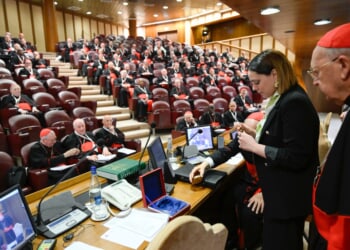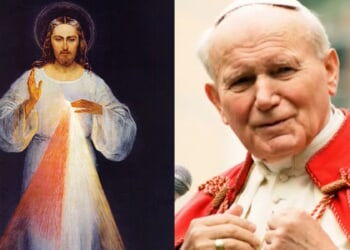Garvan Walshe is a former national and international security policy adviser to the Conservative Party. He runs Article 7 – Intelligence for democrats.
It may only be one poll, but the latest Yougov that puts the Tories on 16 per cent should ring every possible alarm for Conservatives.
The Party is in a battle with Reform and is losing badly. Less noticed, it’s also doing battle with the Liberal Democrats and losing that one too.
Last weekend three European countries held elections in which the centre right held off a challenge from the extremes. Their varied experiences provide hints for what Badenoch needs to do to stave off destruction, which is not, pace Matthew D’Ancona, inevitable, but is more likely than it has been since Iain Duncan Smith was leader.
The most familiar was Portugal’s in which the centre right AD (Democratic Alliance) topped the poll, beating both their traditional centre-left rivals the Socialists, as well as the populist Chega.
In Poland, Warsaw mayor Rafał Trzaskowski leads narrowly going into the run-off against Karol Nawrocki, who represented Law and Justice. Despite being the Tories’ allies in the European Parliament after 2009 one needs to be clear-eyed about Law and Justice: they are an angry divisive party that did severe damage to Poland’s constitution, picked unnecessary fights with Poland’s neighbours and are credibly accused of widespread corruption.
The third election was Romania’s presidential vote, in which centrist mayor of Bucharest Nicoşur Dan prevailed against nationalist George Simion. There the centre right PNL whose candidate came third behind Simion and Dan in the third round and threw its support behind the mayor. In Poland, Trzaszkowski had a disappointing performance. He tried too hard to win over voters to his right by playing down abortion rights and toughening his rhetoric on immigration and Ukrainian farmers. Voters to his left stayed at home. Luis Montenegro was somewhat more successful in Portugal, able to carve out a distinct centre-right identity for his party but still only able to govern in a minority.
The cause of all this complexity is the obsolescence of triangulation. Triangulation — as practiced by Bill Clinton, Tony Blair and David Cameron, was the device of moving to the centre, towards what political scientists call the “median voter”, and betting that voters on your own side have nowhere else to go.
Its success however opened up space on the extremes. Rare is the Western country that doesn’t now have populist parties of both the left and the right, and a First Past the Post system offers the big parties less protection than it seems to.
Triangulation has stopped working because as well as a left-right spectrum, and though the division is still weaker, open-closed, there’s also the dimension of radicalism versus order. The result of two decades of triangulation was to create a politics that was centrist on the left-right dimension, liberal on the open-closed, but because it was in power, committed to defending the status quo despite being founded on an ideology of change. This opened space for radicalism on the extremes of the left-right spectrum that has promised, through the persons of Farage and Corbyn redress for people who feel let down by the system.
If this can be uncomfortable for the left, at least its extremes claim to be aiming in the same egalitarian direction as its centre. On the right the combination is potentially disastrous: a party that believes in defending the existing order and those for whom it works can’t also believe in radical change. Its coalition of support is in permanent danger of splitting, and for the Tories, as for the AD in Portugal, this presents itself as the dilemma over whether to try and win back either the red wall or the blue wall.
Romania’s PNL threw its weight decisively behind the “blue wall”. France’s Républicains attempted to go after their version of the red wall, but faded to irrelevance beside the Rassamblement National.
There is an escape valve that has a chance of securing personal and political survival, and that is to adopt radicalism wholesale, like Orbán has done in Hungary and Trump has in the United States. It comes with both a risk and a cost: the risk is that the traditional radical right benefit to the centre-right’s cost: “Farage is Right, don’t vote for him” is not the best slogan.
The cost is that the radical right’s ideas are bad ones. They stoke division at home and international tension abroad. They are economically illiterate. Despite claiming to represent the ordinary person, they seem incapable of avoiding temptations to be hugely corrupt. They are not disastrous because they tend to be sympathetic to Russia. Russia supports them because they’re disastrous and they want to drag Western democracies down to their level.
In the 1980s, the Tories had a radicalism, with Margaret Thatcher, that was able to address Britain’s post-war economic problems while staying true to Western democracy’s fight against Communism. Now it does not. It would be better advised to emphasise stability and economic growth, like Romania’s PNL, and as David Gauke argued earlier this week.





![CNN’s Jennings Roasts Biden's 'The View' Interview Defenders, Calls Out Coming Meltdown [WATCH]](https://www.right2024.com/wp-content/uploads/2025/04/Scott-Jennings-Wrecks-Former-Hillary-Spokesperson-with-One-Question-on-350x250.jpg)

![Frontier Airline Agents Fired After Video Mocking Passenger on Camera Goes Viral [WATCH]](https://www.right2024.com/wp-content/uploads/2025/05/Frontier-Airline-Agents-Fired-After-Video-Mocking-Passenger-on-Camera-350x250.jpg)
![Stephen A. Smith Goes Ballistic on DeMS-13 Senator Van Hollen [WATCH]](https://www.right2024.com/wp-content/uploads/2025/05/Stephen-A-Smith-Goes-Ballistic-on-DeMS-13-Senator-Van-Hollen-350x250.jpg)
![Dem Rep Caught on Bodycam Physically Attacking Law Enforcement at ICE Detention Facility [WATCH]](https://www.right2024.com/wp-content/uploads/2025/05/Dem-Rep-Caught-on-Bodycam-Physically-Attacking-Law-Enforcement-at-350x250.jpg)

![Minnesota Officials Panicking Over Derek Chauvin Pardon Speculation, Potential Unrest [WATCH]](https://www.right2024.com/wp-content/uploads/2025/05/Minnesota-Officials-Panicking-Over-Derek-Chauvin-Pardon-Speculation-Potential-Unrest-350x250.jpg)




